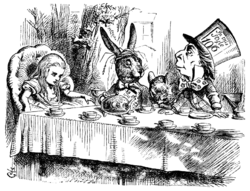
To be as "mad as a March hare" is an English idiomatic phrase derived from the observed antics, said to occur[1] only in the March breeding season of the European hare (Lepus europaeus). The phrase is an allusion that can be used to refer to any other animal or human who behaves in the excitable and unpredictable manner of a March hare.[2]
YouTube Encyclopedic
-
1/3Views:568 122689 384271 107
-
Why Is A Raven Like A Writing Desk?
-
Alice in Wonderland Mad Tea Party
-
Mad Watch
Transcription
Historical development of the idiom

A long-held view is that the hare will behave strangely and excitedly throughout its breeding season, which in Europe peaks in the month of March. This odd behaviour includes boxing at other hares, jumping vertically for seemingly no reason and generally displaying abnormal behaviour.[3] An early verbal record of this animal's strange behaviour occurred in about 1500, in the poem Blowbol's Test[4] where the original poet said:
- Thanne þey begyn to swere and to stare, And be as braynles as a Marshe hare
- (Then they begin to swerve and to stare, And be as brainless as a March hare)
Similar phrases are attested in the sixteenth century in the works of John Skelton (Replycacion, 1528: "Aiii, I saye, thou madde Marche Hare"; Magnyfycence, 1529: "As mery as a marche hare"). A later recorded use of the phrase occurs in the writings of Sir Thomas More (The supplycacyon of soulys made by syr Thomas More knyght councellour to our souerayn lorde the Kynge and chauncellour of hys Duchy of Lancaster. Agaynst the supplycacyon of beggars:[5] "As mad not as a March hare, but as a madde dogge."[3]
Although the phrase in general has been in continuous use since the 16th century,[3] it was popularised in more recent times by Lewis Carroll in his 1865 children's book Alice's Adventures in Wonderland, in which the March Hare is a character.
See also
- The Daily Telegraph Affair of 1908, during which Wilhelm II of Germany referred to the English as being "mad as March hares".
- Hare
- Mad as a hatter
- March Hare
- March Hare (festival)
References
- ^ "Dylan Winter – Irish Hare". BBC Radio 4. Retrieved 2014-01-20.
- ^ "Mad as a March hare". UsingEnglish.com. Retrieved 2014-01-20.
- ^ a b c "As mad as a March hare". Phrase Finder. Retrieved 2014-01-20.
- ^ First printed by W. C. Hazlitt in 1864, Remains of Early Popular Poetry of England
- ^ "Early English Books Online". Text Creation Partnership. Archived from the original on February 8, 2007. Retrieved 2007-04-14.
